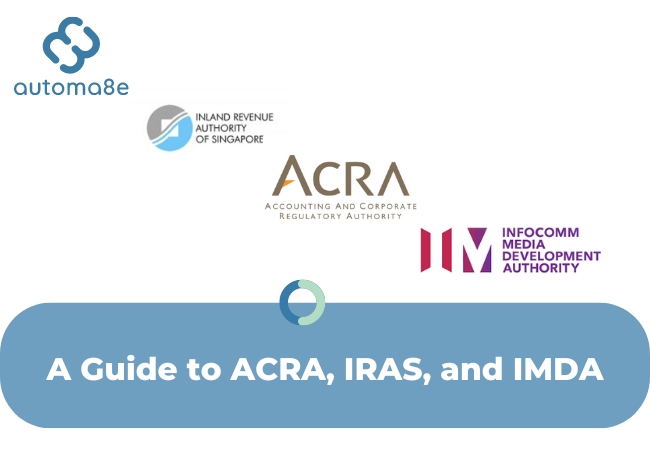Singapore’s thriving business ecosystem owes much of its success to robust regulatory frameworks overseen by various government agencies. Among these, the Accounting and Corporate Regulatory Authority (ACRA), the Inland Revenue Authority of Singapore (IRAS), and the Infocomm Media Development Authority (IMDA) play pivotal roles. This article aims to elucidate the functions of these agencies, discern their differences, and empower SMEs and medium businesses with essential knowledge for navigating Singapore’s regulatory landscape.
In this blog, we’ll explore:
- Introduction
- Understanding ACRA: Functions and Responsibilities
- Unveiling IRAS: Taxation and Compliance
- Delving into IMDA: Driving Digital Transformation
- Key Differences Between ACRA, IRAS, and IMDA
- FAQs: Common Queries Answered
- Conclusion: Harmonizing Business Operations in Singapore
Understanding ACRA: Functions and Responsibilities:
ACRA serves as the custodian of Singapore’s corporate sector, overseeing business registration, compliance, and financial reporting. Its digital platform, BizFile+, facilitates seamless transactions and information retrieval for companies. ACRA ensures adherence to the Companies Act, safeguarding the integrity and transparency of Singapore’s business environment.
Unveiling IRAS: Taxation and Compliance:
IRAS shoulders the responsibility of collecting tax revenue and ensuring compliance with tax laws. Through platforms like the myTax Portal, individuals and businesses can fulfill their tax obligations conveniently. IRAS conducts audits to uphold tax accuracy and penalizes non-compliance to maintain fiscal discipline.
Delving into IMDA: Driving Digital Transformation:
IMDA spearheads Singapore’s digitalization agenda, fostering innovation and inclusivity in the digital realm. By promoting initiatives like electronic invoicing, IMDA accelerates the nation’s transition to a digital economy. It collaborates with stakeholders to develop talent and infrastructure, positioning Singapore as a global digital hub.
Key Differences Between ACRA, IRAS, and IMDA:
ACRA focuses on corporate registration and governance, IRAS manages taxation and fiscal compliance, while IMDA drives digitalization and technological advancement. Understanding these distinctions is vital for businesses to engage effectively with each agency and fulfill their obligations comprehensively.
FAQs: Common Queries Answered:
Non-compliance with ACRA and IRAS regulations can lead to various penalties depending on the severity of the offense. ACRA may impose fines, issue court summons, or strike off the company for serious breaches such as failure to file annual returns or maintain proper accounting records. Similarly, IRAS imposes penalties for late or incorrect tax filings, including fines, late payment penalties, and potential prosecution for tax evasion. It is crucial for businesses to adhere to regulatory requirements to avoid such penalties and maintain good standing.
Businesses can leverage digital platforms offered by ACRA, IRAS, and IMDA to streamline operations, enhance efficiency, and ensure compliance. ACRA’s BizFile+ enables businesses to register, file documents, and retrieve information online, saving time and reducing paperwork. IRAS’s myTax Portal allows for convenient filing and payment of taxes, checking of tax status, and accessing tax-related services. IMDA provides digital solutions and initiatives to drive innovation and productivity, empowering businesses to adopt digital technologies for growth and competitiveness.
IMDA offers various support programs and initiatives to assist SMEs and medium businesses in their digital transformation journey. This includes funding schemes such as the SMEs Go Digital program, which provides grants for adopting digital solutions to improve productivity and competitiveness. IMDA also offers consultancy services, training programs, and access to digital tools and resources to help businesses navigate digital challenges and opportunities. By partnering with IMDA, SMEs and medium businesses can accelerate their digital transformation and stay ahead in today’s digital economy.
Conclusion: Harmonizing Business Operations in Singapore:
Navigating Singapore’s regulatory landscape requires a nuanced understanding of the roles played by ACRA, IRAS, and IMDA. SMEs and medium businesses can optimize their operations by complying with regulatory requirements, harnessing digital tools, and embracing innovation. By aligning with Singapore’s regulatory authorities and embracing digital transformation, businesses can thrive in an environment conducive to growth and prosperity.
This comprehensive guide empowers entrepreneurs to navigate the complexities of Singapore’s regulatory landscape with confidence and clarity, fostering a conducive environment for business success.
